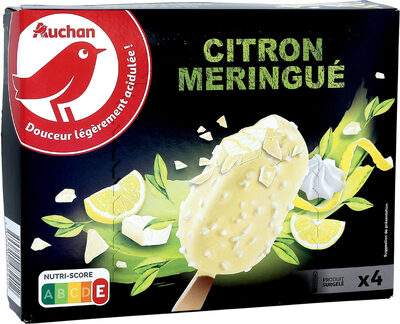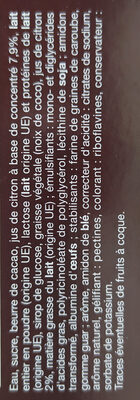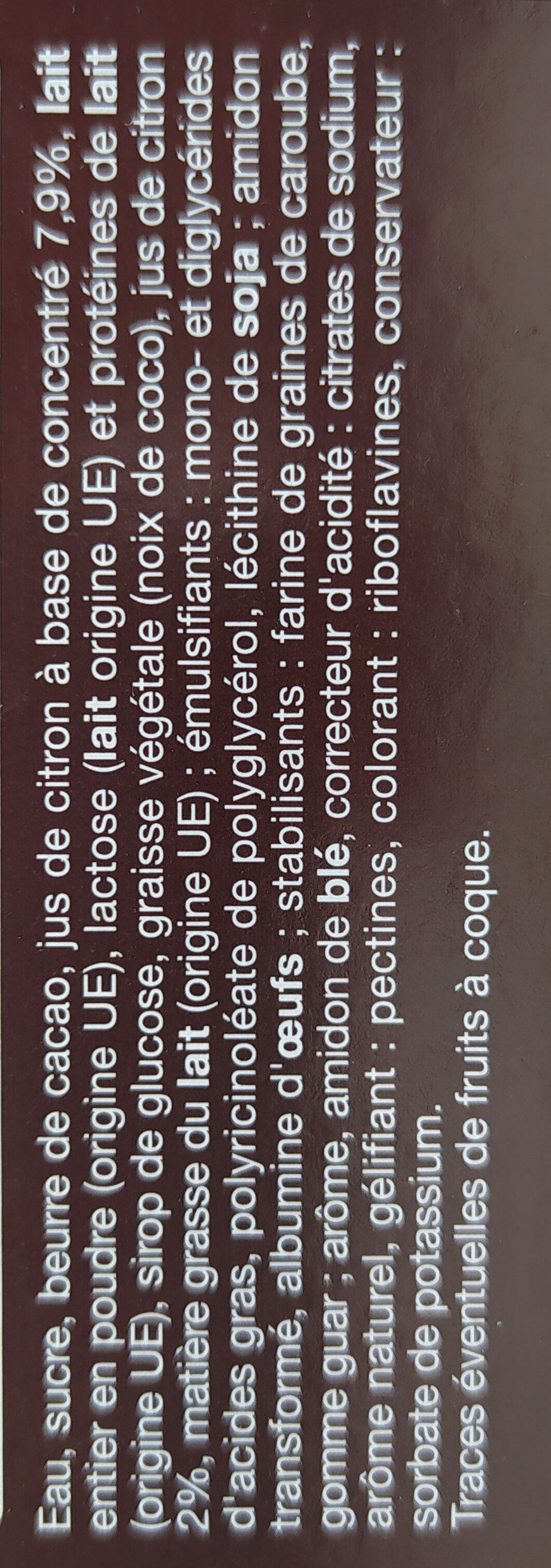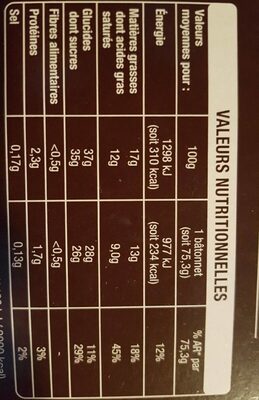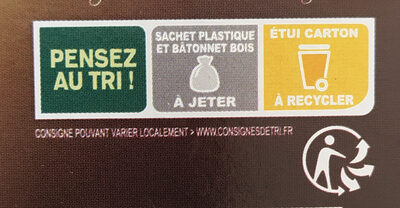Help us make food transparency the norm!
As a non-profit organization, we depend on your donations to continue informing consumers around the world about what they eat.
The food revolution starts with you!
Citron meringué - Auchan - 0.301 kg
Citron meringué - Auchan - 0.301 kg
Some of the data for this product has been provided directly by the manufacturer AUCHAN APAW.
Barcode: 3596710482412 (EAN / EAN-13)
Common name: Bâtonnets de glace goût citron meringué (60,3%), enrobage chocolat blanc (29,2%), sauce au citron (7,9%), morceaux de meringue enrobés de beurre de cacao (2,6%), surgelés.
Quantity: 0.301 kg
Packaging: fr:Emballage carton, fr:Sachet en plastique, fr:Sachet plastique
Brands: Auchan
Categories: Desserts, Frozen foods, Frozen desserts, Ice creams and sorbets, Ice creams, Ice cream bars
Labels, certifications, awards:
Green Dot, In braille, Nutriscore, Nutriscore Grade E, fr:Écrit en braille
Origin of ingredients: France
Manufacturing or processing places: France
Traceability code: EMB 35360C - Vitré (Ille-et-Vilaine, France)
Link to the product page on the official site of the producer: http://www.auchan.fr
Stores: Auchan
Matching with your preferences
Health
Ingredients
-
27 ingredients
French: Eau, sucre, beurre de cacao, jus de citron à base de concentré 7,9%, LAIT entier en poudre, lactose (LAIT) et protéines de LAIT, sirop de glucose, graisse végétale (noix de coco), jus de citron 2%, matière grasse du LAIT émulsifiants : mono - et diglycérides d'acides gras, polyricinoléate de polyglycérol, lécithine de SOJA amidon transformé, albumine d'OEUFS stabilisants : farine de graines de caroube, gomme guar arôme, amidon de BLÉ, correcteur d'acidité : citrates de sodium, arôme naturel, gélifiant : pectines, colorant : riboflavines, conservateur : sorbate de potassium. Traces éventuelles de fruits à coque.Allergens: Eggs, Gluten, Milk, SoybeansTraces: Nuts
Food processing
-
Ultra processed foods
Elements that indicate the product is in the 4 - Ultra processed food and drink products group:
- Additive: E101 - Riboflavin
- Additive: E322 - Lecithins
- Additive: E412 - Guar gum
- Additive: E440 - Pectins
- Additive: E471 - Mono- and diglycerides of fatty acids
- Additive: E476 - Polyglycerol polyricinoleate
- Ingredient: Colour
- Ingredient: Flavouring
- Ingredient: Gelling agent
- Ingredient: Glucose
- Ingredient: Glucose syrup
- Ingredient: Lactose
- Ingredient: Milk proteins
Food products are classified into 4 groups according to their degree of processing:
- Unprocessed or minimally processed foods
- Processed culinary ingredients
- Processed foods
- Ultra processed foods
The determination of the group is based on the category of the product and on the ingredients it contains.
Additives
-
E101 - Riboflavin
Riboflavin: Riboflavin, also known as vitamin B2, is a vitamin found in food and used as a dietary supplement. Food sources include eggs, green vegetables, milk and other dairy product, meat, mushrooms, and almonds. Some countries require its addition to grains. As a supplement it is used to prevent and treat riboflavin deficiency and prevent migraines. It may be given by mouth or injection.It is nearly always well tolerated. Normal doses are safe during pregnancy. Riboflavin is in the vitamin B group. It is required by the body for cellular respiration.Riboflavin was discovered in 1920, isolated in 1933, and first made in 1935. It is on the World Health Organization's List of Essential Medicines, the most effective and safe medicines needed in a health system. Riboflavin is available as a generic medication and over the counter. In the United States a month of supplements costs less than 25 USD.Source: Wikipedia
-
E101i - Riboflavin
Riboflavin: Riboflavin, also known as vitamin B2, is a vitamin found in food and used as a dietary supplement. Food sources include eggs, green vegetables, milk and other dairy product, meat, mushrooms, and almonds. Some countries require its addition to grains. As a supplement it is used to prevent and treat riboflavin deficiency and prevent migraines. It may be given by mouth or injection.It is nearly always well tolerated. Normal doses are safe during pregnancy. Riboflavin is in the vitamin B group. It is required by the body for cellular respiration.Riboflavin was discovered in 1920, isolated in 1933, and first made in 1935. It is on the World Health Organization's List of Essential Medicines, the most effective and safe medicines needed in a health system. Riboflavin is available as a generic medication and over the counter. In the United States a month of supplements costs less than 25 USD.Source: Wikipedia
-
E202 - Potassium sorbate
Potassium sorbate (E202) is a synthetic food preservative commonly used to extend the shelf life of various food products.
It works by inhibiting the growth of molds, yeast, and some bacteria, preventing spoilage. When added to foods, it helps maintain their freshness and quality.
Some studies have shown that when combined with nitrites, potassium sorbate have genotoxic activity in vitro. However, potassium sorbate is generally recognized as safe (GRAS) by regulatory authorities.
-
E322 - Lecithins
Lecithins are natural compounds commonly used in the food industry as emulsifiers and stabilizers.
Extracted from sources like soybeans and eggs, lecithins consist of phospholipids that enhance the mixing of oil and water, ensuring smooth textures in various products like chocolates, dressings, and baked goods.
They do not present any known health risks.
-
E322i - Lecithin
Lecithins are natural compounds commonly used in the food industry as emulsifiers and stabilizers.
Extracted from sources like soybeans and eggs, lecithins consist of phospholipids that enhance the mixing of oil and water, ensuring smooth textures in various products like chocolates, dressings, and baked goods.
They do not present any known health risks.
-
E331 - Sodium citrates
Sodium citrate: Sodium citrate may refer to any of the sodium salts of citrate -though most commonly the third-: Monosodium citrate Disodium citrate Trisodium citrateThe three forms of the salt are collectively known by the E number E331. Sodium citrates are used as acidity regulators in food and drinks, and also as emulsifiers for oils. They enable cheeses to melt without becoming greasy.Source: Wikipedia
-
E412 - Guar gum
Guar gum (E412) is a natural food additive derived from guar beans.
This white, odorless powder is valued for its remarkable thickening and stabilizing properties, making it a common ingredient in various food products, including sauces, dressings, and ice creams.
When used in moderation, guar gum is considered safe for consumption, with no known adverse health effects.
-
E440 - Pectins
Pectins (E440) are natural carbohydrates, predominantly found in fruits, that act as gelling agents in the food industry, creating the desirable jelly-like texture in jams, jellies, and marmalades.
Pectins stabilize and thicken various food products, such as desserts, confectioneries, and beverages, ensuring a uniform consistency and quality.
Recognized as safe by various health authorities, pectins have been widely used without notable adverse effects when consumed in typical dietary amounts.
-
E471 - Mono- and diglycerides of fatty acids
Mono- and diglycerides of fatty acids (E471), are food additives commonly used as emulsifiers in various processed foods.
These compounds consist of glycerol molecules linked to one or two fatty acid chains, which help stabilize and blend water and oil-based ingredients. E471 enhances the texture and shelf life of products like margarine, baked goods, and ice cream, ensuring a smooth and consistent texture.
It is generally considered safe for consumption within established regulatory limits.
-
E476 - Polyglycerol polyricinoleate
Polyglycerol polyricinoleate: Polyglycerol polyricinoleate -PGPR-, E476, is an emulsifier made from glycerol and fatty acids -usually from castor bean, but also from soybean oil-. In chocolate, compound chocolate and similar coatings, PGPR is mainly used with another substance like lecithin to reduce viscosity. It is used at low levels -below 0.5%-, and works by decreasing the friction between the solid particles -e.g. cacao, sugar, milk- in molten chocolate, reducing the yield stress so that it flows more easily, approaching the behaviour of a Newtonian fluid. It can also be used as an emulsifier in spreads and in salad dressings, or to improve the texture of baked goods. It is made up of a short chain of glycerol molecules connected by ether bonds, with ricinoleic acid side chains connected by ester bonds. PGPR is a yellowish, viscous liquid, and is strongly lipophilic: it is soluble in fats and oils and insoluble in water and ethanol.Source: Wikipedia
Ingredients analysis
-
May contain palm oil
Ingredients that may contain palm oil: E471
-
Non-vegan
Non-vegan ingredients: Whole milk powder, Lactose, Milk proteinsSome ingredients could not be recognized.
We need your help!
You can help us recognize more ingredients and better analyze the list of ingredients for this product and others:
- Edit this product page to correct spelling mistakes in the ingredients list, and/or to remove ingredients in other languages and sentences that are not related to the ingredients.
- Add new entries, synonyms or translations to our multilingual lists of ingredients, ingredient processing methods, and labels.
If you would like to help, join the #ingredients channel on our Slack discussion space and/or learn about ingredients analysis on our wiki. Thank you!
-
Vegetarian status unknown
Unrecognized ingredients: fr:matiere-grasse-du-lait-emulsifiants, fr:lecithine-de-soja-amidon-transforme, fr:albumine-d-oeufs-stabilisants, fr:gomme-guar-aromeSome ingredients could not be recognized.
We need your help!
You can help us recognize more ingredients and better analyze the list of ingredients for this product and others:
- Edit this product page to correct spelling mistakes in the ingredients list, and/or to remove ingredients in other languages and sentences that are not related to the ingredients.
- Add new entries, synonyms or translations to our multilingual lists of ingredients, ingredient processing methods, and labels.
If you would like to help, join the #ingredients channel on our Slack discussion space and/or learn about ingredients analysis on our wiki. Thank you!
-
Details of the analysis of the ingredients
We need your help!
Some ingredients could not be recognized.
We need your help!
You can help us recognize more ingredients and better analyze the list of ingredients for this product and others:
- Edit this product page to correct spelling mistakes in the ingredients list, and/or to remove ingredients in other languages and sentences that are not related to the ingredients.
- Add new entries, synonyms or translations to our multilingual lists of ingredients, ingredient processing methods, and labels.
If you would like to help, join the #ingredients channel on our Slack discussion space and/or learn about ingredients analysis on our wiki. Thank you!
fr: Eau, sucre, beurre de cacao, jus de citron à base de concentré 7.9%, LAIT entier en poudre, lactose, protéines de LAIT, sirop de glucose, graisse végétale de noix de coco, jus de citron 2%, matière grasse du LAIT émulsifiants (mono- et diglycérides d'acides gras), polyricinoléate de polyglycérol, lécithine de SOJA amidon transformé, albumine d'OEUFS stabilisants (farine de graines de caroube), gomme guar arôme, amidon de BLÉ, correcteur d'acidité (citrates de sodium), arôme naturel, gélifiant (pectines), colorant (riboflavines), conservateur (sorbate de potassium)- Eau -> en:water - vegan: yes - vegetarian: yes - ciqual_food_code: 18066 - percent_min: 7.9 - percent_max: 64.3
- sucre -> en:sugar - vegan: yes - vegetarian: yes - ciqual_proxy_food_code: 31016 - percent_min: 7.9 - percent_max: 35
- beurre de cacao -> en:cocoa-butter - vegan: yes - vegetarian: yes - ciqual_food_code: 16030 - percent_min: 7.9 - percent_max: 26.7
- jus de citron à base de concentré -> en:lemon-juice-from-concentrate - vegan: yes - vegetarian: yes - ciqual_food_code: 2028 - percent_min: 7.9 - percent: 7.9 - percent_max: 7.9
- LAIT entier en poudre -> en:whole-milk-powder - vegan: no - vegetarian: yes - ciqual_food_code: 19021 - percent_min: 2 - percent_max: 7.9
- lactose -> en:lactose - vegan: no - vegetarian: yes - percent_min: 2 - percent_max: 7.9
- protéines de LAIT -> en:milk-proteins - vegan: no - vegetarian: yes - percent_min: 2 - percent_max: 7.9
- sirop de glucose -> en:glucose-syrup - vegan: yes - vegetarian: yes - ciqual_proxy_food_code: 31016 - percent_min: 2 - percent_max: 7.9
- graisse végétale de noix de coco -> en:coconut-oil - vegan: yes - vegetarian: yes - from_palm_oil: no - ciqual_food_code: 16040 - percent_min: 2 - percent_max: 7.9
- jus de citron -> en:lemon-juice - vegan: yes - vegetarian: yes - ciqual_food_code: 2028 - percent_min: 2 - percent: 2 - percent_max: 2
- matière grasse du LAIT émulsifiants -> fr:matiere-grasse-du-lait-emulsifiants - percent_min: 0 - percent_max: 2
- mono- et diglycérides d'acides gras -> en:e471 - vegan: maybe - vegetarian: maybe - from_palm_oil: maybe - percent_min: 0 - percent_max: 2
- polyricinoléate de polyglycérol -> en:e476 - vegan: yes - vegetarian: yes - percent_min: 0 - percent_max: 2
- lécithine de SOJA amidon transformé -> fr:lecithine-de-soja-amidon-transforme - percent_min: 0 - percent_max: 2
- albumine d'OEUFS stabilisants -> fr:albumine-d-oeufs-stabilisants - percent_min: 0 - percent_max: 2
- farine de graines de caroube -> en:carob-seed-flour - vegan: yes - vegetarian: yes - ciqual_proxy_food_code: 9410 - percent_min: 0 - percent_max: 2
- gomme guar arôme -> fr:gomme-guar-arome - percent_min: 0 - percent_max: 2
- amidon de BLÉ -> en:wheat-starch - vegan: yes - vegetarian: yes - ciqual_proxy_food_code: 9510 - percent_min: 0 - percent_max: 2
- correcteur d'acidité -> en:acidity-regulator - percent_min: 0 - percent_max: 2
- citrates de sodium -> en:e331 - vegan: yes - vegetarian: yes - percent_min: 0 - percent_max: 2
- arôme naturel -> en:natural-flavouring - vegan: maybe - vegetarian: maybe - percent_min: 0 - percent_max: 2
- gélifiant -> en:gelling-agent - percent_min: 0 - percent_max: 2
- pectines -> en:e440a - vegan: yes - vegetarian: yes - percent_min: 0 - percent_max: 2
- colorant -> en:colour - percent_min: 0 - percent_max: 2
- riboflavines -> en:e101 - vegan: maybe - vegetarian: yes - percent_min: 0 - percent_max: 2
- conservateur -> en:preservative - percent_min: 0 - percent_max: 2
- sorbate de potassium -> en:e202 - vegan: yes - vegetarian: yes - percent_min: 0 - percent_max: 2
Nutrition
-
Bad nutritional quality
⚠ ️Warning: the amount of fruits, vegetables and nuts is not specified on the label, it was estimated from the list of ingredients: 9This product is not considered a beverage for the calculation of the Nutri-Score.
Positive points: 0
- Proteins: 1 / 5 (value: 2.3, rounded value: 2.3)
- Fiber: 0 / 5 (value: 0.5, rounded value: 0.5)
- Fruits, vegetables, nuts, and colza/walnut/olive oils: 0 / 5 (value: 9.9, rounded value: 9.9)
Negative points: 20
- Energy: 3 / 10 (value: 1298, rounded value: 1298)
- Sugars: 7 / 10 (value: 35, rounded value: 35)
- Saturated fat: 10 / 10 (value: 12, rounded value: 12)
- Sodium: 0 / 10 (value: 68, rounded value: 68)
The points for proteins are not counted because the negative points are greater or equal to 11.
Nutritional score: (20 - 0)
Nutri-Score:
-
Nutrient levels
-
Fat in moderate quantity (17%)
What you need to know- A high consumption of fat, especially saturated fats, can raise cholesterol, which increases the risk of heart diseases.
Recommendation: Limit the consumption of fat and saturated fat- Choose products with lower fat and saturated fat content.
-
Saturated fat in high quantity (12%)
What you need to know- A high consumption of fat, especially saturated fats, can raise cholesterol, which increases the risk of heart diseases.
Recommendation: Limit the consumption of fat and saturated fat- Choose products with lower fat and saturated fat content.
-
Sugars in high quantity (35%)
What you need to know- A high consumption of sugar can cause weight gain and tooth decay. It also augments the risk of type 2 diabetes and cardio-vascular diseases.
Recommendation: Limit the consumption of sugar and sugary drinks- Sugary drinks (such as sodas, fruit beverages, and fruit juices and nectars) should be limited as much as possible (no more than 1 glass a day).
- Choose products with lower sugar content and reduce the consumption of products with added sugars.
-
Salt in low quantity (0.17%)
What you need to know- A high consumption of salt (or sodium) can cause raised blood pressure, which can increase the risk of heart disease and stroke.
- Many people who have high blood pressure do not know it, as there are often no symptoms.
- Most people consume too much salt (on average 9 to 12 grams per day), around twice the recommended maximum level of intake.
Recommendation: Limit the consumption of salt and salted food- Reduce the quantity of salt used when cooking, and don't salt again at the table.
- Limit the consumption of salty snacks and choose products with lower salt content.
-
-
Nutrition facts
Nutrition facts As sold
for 100 g / 100 mlAs sold
per serving (75.3 g (1 grand gourmand citron meringué))Compared to: Ice cream bars Energy 1,298 kj
(310 kcal)977 kj
(233 kcal)+6% Fat 17 g 12.8 g -6% Saturated fat 12 g 9.04 g -2% Carbohydrates 37 g 27.9 g +27% Sugars 35 g 26.4 g +39% Fiber 0.5 g 0.377 g -52% Proteins 2.3 g 1.73 g -32% Salt 0.17 g 0.128 g +10% Fruits‚ vegetables‚ nuts and rapeseed‚ walnut and olive oils (estimate from ingredients list analysis) 9.9 % 9.9 %
Environment
-
Eco-Score B - Low environmental impact
⚠ ️Select a country in order to include the full impact of transportation.The Eco-Score is an experimental score that summarizes the environmental impacts of food products.→ The Eco-Score was initially developped for France and it is being extended to other European countries. The Eco-Score formula is subject to change as it is regularly improved to make it more precise and better suited to each country.Life cycle analysis
-
Average impact of products of the same category: A (Score: 87/100)
Category: Ice cream, cone (normal size)
Category: Ice cream, cone (normal size)
- PEF environmental score: 0.22 (the lower the score, the lower the impact)
- including impact on climate change: 1.74 kg CO2 eq/kg of product
Stage Impact Agriculture
56.4 %Processing
18.3 %Packaging
6.8 %Transportation
7.0 %Distribution
7.3 %Consumption
4.2 %
Bonuses and maluses
-
Origins of ingredients with a medium impact
Bonus: +4
Environmental policy: +4
Transportation: 0
Origin of the product and/or its ingredients % of ingredients Impact France 100 %Medium
-
Packaging with a medium impact
Malus: -11
Shape Material Recycling Impact Bag Plastic High Packaging Cardboard Low
Eco-Score for this product
-
Impact for this product: B (Score: 79/100)
Product: Citron meringué - Auchan - 0.301 kg
Life cycle analysis score: 87
Sum of bonuses and maluses: -7
Final score: 79/100 (The score of products with non-recyclable and non-biodegradable packaging materials is capped at 79 (grade B).)
-
Carbon footprint
-
Equal to driving 0.9 km in a petrol car
174 g CO² per 100g of product
The carbon emission figure comes from ADEME's Agribalyse database, for the category: Ice cream, cone (normal size) (Source: ADEME Agribalyse Database)
Stage Impact Agriculture
60.7 %Processing
12.4 %Packaging
10.4 %Transportation
11.3 %Distribution
3.8 %Consumption
1.5 %
Packaging
-
Packaging with a medium impact
-
Packaging parts
Bag (Plastic)
Packaging (Cardboard)
-
Packaging materials
Material % Packaging weight Packaging weight per 100 g of product Paper or cardboard Plastic Total
-
Transportation
-
Origins of ingredients
Origins of ingredients with a medium impact
Origin of the product and/or its ingredients % of ingredients Impact France 100 %Medium
Other information
Preparation: On vous en donne plus! Pour mieux savourer votre bâtonnet, nous vous conseillons de le sortir quelques minutes avant dégustation. On vous aime en pleine forme!Buvez de l'eau sans modération et bougez au moins 30 minutes par jour.:
Report a problem
-
Incomplete or incorrect information?
Category, labels, ingredients, allergens, nutritional information, photos etc.
If the information does not match the information on the packaging, please complete or correct it. Open Food Facts is a collaborative database, and every contribution is useful for all.
Data sources
The manufacturer AUCHAN APAW uses Agena3000 to automatically transmit data and photos for its products.
Product added on by kiliweb
Last edit of product page on by moon-rabbit.
Product page also edited by arc2, charlesnepote, halal-app-chakib, manu1400, org-auchan-apaw, packbot, roboto-app, sasa, yuka.Le0ZZ-CmNs9xNfTA0Y8YwTflGO3CWMIICkMfog.
